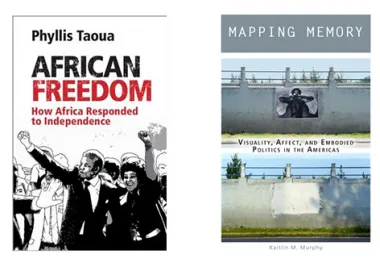Important New Books from Program Faculty

Program Faculty Members, Kaitlin Murphy and Phyllis Taoua, recently published two important human rights books. Murphy’s book Mapping Memory: Visuality, Affect, and Embodied Politics in the Americas from Fordham University Press, “investigates the use of memory as a means of contemporary sociopolitical intervention. Mapping Memory focuses specifically on visual case studies, including documentary film, photography, performance, new media, and physical places of memory, from sites ranging from the Southern Cone to Central America and the U.S.–Mexican borderlands. Murphy develops new frameworks for analyzing how visual culture performs as an embodied agent of memory and witnessing, arguing that visuality is inherently performative.”
Taoua’s book from Cambridge University Press is titled African Freedom: How Africa Responded to Independence. "The push for independence in African nations was ultimately an incomplete process, with the people often left to wrestle with a partial, imperfect legacy. Rather than settle for liberation in name alone, the people engaged in an ongoing struggle for meaningful freedom. Phyllis Taoua shows how the idea of freedom in Africa today evolved from this complex history. With a pan-African, interdisciplinary approach, she synthesizes the most significant issues into a clear, compelling narrative. Tracing the evolution of a conversation about freedom since the 1960s, she defines three types and shows how they are interdependent. Taoua investigates their importance in key areas of narrative interest: the intimate self, gender identity, the nation, global capital, and the spiritual realm. Allowing us to hear the voices of African artists and activists, this compelling study makes sense of their struggle and the broad importance of the idea of freedom in contemporary African culture.”

